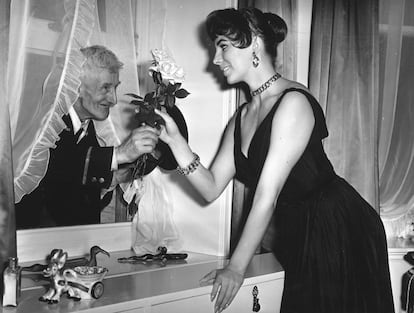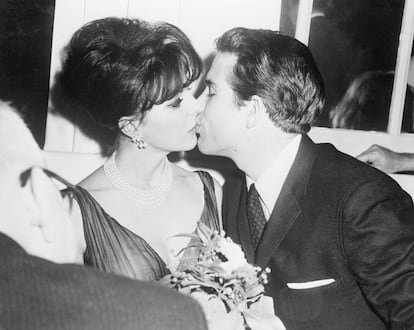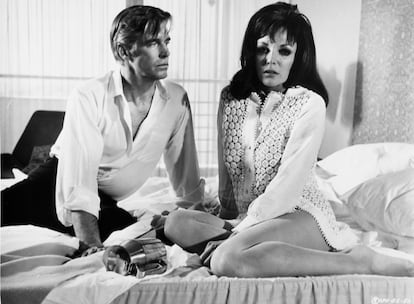The day Marilyn Monroe warned Joan Collins about ‘the wolves of Hollywood’
In an explosive biography to be released on September 28, the ‘Dynasty’ star recounts the harassment she endured from actors, directors and producers and names names

British actress Joan Collins writes that at first she did not recognize the blonde woman drinking alone at the bar. She had arrived in Hollywood only a few months earlier, after signing a contract with 20th Century Fox in 1955. That same year, she had starred in The Girl in the Red Velvet Swing, a film based on true events in which Collins played model, showgirl and actress Evelyn Nesbit, whose husband, billionaire Harry Kendall Thaw, ended up murdering her lover, architect Stanford White, in a scandal that shocked American society in 1906. ‘They wanted me to play the lead in The Girl in the Red Velvet Swing, but I’m too old,” the blonde at the bar told Collins in a sad voice. Only then did Joan Collins realize that she was sitting next to Marilyn Monroe.
“She was extremely friendly, so we started chatting. After a couple of martinis, she warned me about the harassment in Hollywood and the ‘wolves in this town,’” Joan Collins, 90, now reveals in her explosive new memoir, Behind the Shoulder Pads: Tales I Tell My Friends, which will be published on September 28; the British newspaper Daily Mail recently published a preview. Collins tells of her encounters with figures like Queen Elizabeth II, Elizabeth Taylor, Princess Diana and her ex-boyfriend, fellow actor Warren Beatty. But in the wake of the Harvey Weinstein case and the MeToo movement, Collins also discusses some of the episodes of sexual abuse and power that she experienced in the past. But let’s go back to Marilyn Monroe, the martinis and the wolves of Hollywood for a moment: “I replied that I was well used to them after several years in the British film industry,” the veteran actress says in her book. “All of us had to put up with having our bottoms patted and men leering down our cleavage.”
“That’s nothing compared to the studio power bosses, honey,’ Marilyn replied. ‘If they don’t get what they want, they’ll drop your contract.’” Then Monroe warned her: “Watch out for Zanuck. If he doesn’t get what he wants, he’ll fire you.’” Collins took note. Just a few days later, Darryl Zanuck, the producer of classic films like The Grapes of Wrath (1940), How Green Was My Valley (1941) and All About Eve (1950), pounced on her at the studios, trapping her against the wall, and told her that he was “the biggest and the best” and could “go all night.” Now talkative and shrewd, at the time Collins was left speechless; she slipped away from the powerful producer as best she could and went back to the set. “I heard that a starlet had recently been fired because when he said: ‘Baby, I’m the biggest in the business . . .’ she responded with: ‘You’d better be, ‘cause you’re only five foot two!’” Collins writes.
That wasn’t the first or last time that Joan Collins experienced an abuse of power in golden-age Hollywood. She shares all of those instances in her new book. She doesn’t mince words and names names, always prefacing the revelation with the phrase, “Not to speak ill of the dead (but I will!).” The actress explains that “in the aftermath of the Harvey Weinstein scandal, the full extent of the depravity that pretty young actresses were forced to descend to for potential roles was finally out in the open and no longer continues — or at least is no longer accepted. I hope. But it went on for far too many decades. I know, because I was there.”
“Frigid little witch”

“My first encounter with the casting couch was while testing for the juvenile lead in the 1952 British movie I Believe in You,” the actress recalls. “One of the producers had made such obvious advances that I had to dodge him by hiding in a wardrobe in the costume department, helped by sympathetic dressers, and waiting until he left the studio before taking the bus and Tube home.” But one day that producer intercepted her on her way home and encouraged her to get into his Bentley so he could take her home: “During the ride, he grabbed my hand and put it on his open fly. I screamed in horror and yanked my hand away. ‘What’s the matter? Don’t you want the part?’ he leered. ‘Not this much,’ I cried, childishly bursting into tears as I [realized] I had blown my chances. I’d never seen a naked man before, let alone felt one.” The producer was shocked and asked Joan Collins if she was frigid, as if that were the only possible reason she would refuse his advances.
“It was the first time I had been called that by a man, but sadly not the last. Men who, because they were rich or powerful, thought that women were playthings could be very cruel,” the performer now recounts. “Luckily, this producer was overruled by the director and the head of the studio, so I got that role despite his threats. However, he still pursued me, and when I told him I wasn’t interested and was still a virgin he called me a ‘frigid little witch.’”
In her book, Collins mentions a long list of predators, including actors, producers and directors: “Sadly, many of the actors I worked with considered it their divine right to have sex with their leading lady,” she writes. “At the age of 21 I had repeatedly said no to a handsome, if short, famous actor I was working with. One night after shooting, he followed my car and when I paused at the Twentieth Century Fox exit gate, he shouted at the top of his lungs: ‘You stupid cow — you’ll be washed up by the time you’re 23!’ Luckily, I was under contract and for a good salary, so I considered myself reasonably safe until I hit 27, which was widely deemed by studio bosses to be the age that women lost their sexual allure.”
Actors, producers and directors
Joan Collins recalls that, in the early 1960s, she was offered the role of Cleopatra in director Joseph L. Mankiewicz’s film of the same title on more than one occasion; the part ended up being played by Elizabeth Taylor, who became the highest paid actress of the time. “Both the head of Fox, Buddy Adler, and the chairman of the board — a Greek gentleman old enough to be my grandfather — had bombarded me with propositions and flowers, culminating in promises to cast me as Cleopatra if only I would be ‘nice’ to them. They both used this euphemism, quite prevalent in Hollywood at the time.” Collins claims that the very idea of “these old men” laying a hand on her repulsed her, “so I dodged and I dived and hid around the lot and made excuses while the studio tested me for Cleopatra ad infinitum.” It all ended at a “glamorous industry party,” as she describes it, where Adler took her out dancing and proposed giving her the part and a nice apartment in exchange for her visiting three or four times a week. Collins responded that her agent was at that party as well, so it might be best to share the details with him. “‘Honey, you have quite a sense of [humor],” Adler replied.
“Elizabeth Taylor got to play the part opposite Richard Burton, another predatory actor I had played opposite in the 1957 war film Sea Wife.” According to Collins, Burton told her that they should sleep together so as not to “break his record.” Burton’s “record” was having sex with every actress with whom he starred in a film. Collins turned him down and they never spoke to each other again during the shoot.

Collins goes on to note that George Peppard behaved similarly. Peppard, who is known for playing Holly Golightly’s romantic interest in Breakfast at Tiffany’s and Hannibal in The A-Team, co-starred opposite Collins in the 1970 film The Executioner. During the kick-off party, Peppard walked her home and tried to sleep with her. Joan Collins told him she was married and had children, to which he replied that she was “totally square.” It didn’t end there; he then made filming impossible for her, taking advantage of her in bed scenes and giving her kisses with tongue in romantic scenes: “When I politely extricated his tongue from my throat for the fourth time, I became angry,” writes the actress. She complained to the director about that behavior, but he did nothing to stop it. “Did you enjoy that?” asked Peppard. “No, I hated it,” Collins replied. “‘You’re such a prude,’ he sneered. ‘Most actresses love it.’” “Well, I’m not one of them.” After that, they stopped talking to each other and, when necessary, the actors only communicated with each other through their respective makeup artists.
For Collins, this story has a happy ending: “When George [Peppard] was cast as the lead in a new serial drama called Oil, he was so difficult that the producer Aaron Spelling fired him. They recast with John Forsythe, retitled it Dynasty . . . and the rest is history. I don’t think I could have stood nine years working with George Peppard.”
At 90 years old, Joan Collins is one of the few remaining relics of old Hollywood. In her golden years, the actress appeared in more than 60 films and 15 plays, although it was the character of the evil Alexis Colby in Dynasty that brought her back into the spotlight and made her famous around the world. But Joan Collins’s best role might simply be being Joan Collins. With over a dozen nonfiction books published, she has become an excellent chronicler of a time and place that, for some people, are now thankfully in the past. But that doesn’t mean it’s not worth looking back at the appalling behavior that went on for far too long in Hollywood. Collins knows because she was there.
Sign up for our weekly newsletter to get more English-language news coverage from EL PAÍS USA Edition
Tu suscripción se está usando en otro dispositivo
¿Quieres añadir otro usuario a tu suscripción?
Si continúas leyendo en este dispositivo, no se podrá leer en el otro.
FlechaTu suscripción se está usando en otro dispositivo y solo puedes acceder a EL PAÍS desde un dispositivo a la vez.
Si quieres compartir tu cuenta, cambia tu suscripción a la modalidad Premium, así podrás añadir otro usuario. Cada uno accederá con su propia cuenta de email, lo que os permitirá personalizar vuestra experiencia en EL PAÍS.
¿Tienes una suscripción de empresa? Accede aquí para contratar más cuentas.
En el caso de no saber quién está usando tu cuenta, te recomendamos cambiar tu contraseña aquí.
Si decides continuar compartiendo tu cuenta, este mensaje se mostrará en tu dispositivo y en el de la otra persona que está usando tu cuenta de forma indefinida, afectando a tu experiencia de lectura. Puedes consultar aquí los términos y condiciones de la suscripción digital.









































